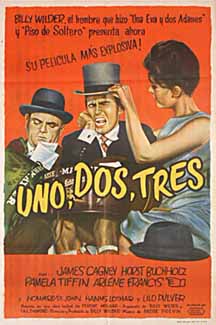
ONE TWO THREE
US, 1951, 115 minutes, Black and white.
James Cagney, Horst Buchholz, Pamela Tiffin, Arlene Francis, Howard St John.
Directed by Billy Wilder.
Billy Wilder adapted a play by Ferenc Molnar, a prolific playwright on whose plays both on the Continent and in the United States were based, including Olympia (A Breath of Scandal), The Swan and, especially, Liliom which became Rodgers and Hammerstein’s musical Carousel. Wilder is writing in collaboration I.A.L. Diamond, who had written a number of American comedies, Let’s Make It Legal, Something for the Birds, and who from 1959 with Some Like It Hot collaborated with Wilder on eleven films (the only film that was not Wilder’s during this period was Cactus Flower).
Both Diamond and Wilder were experts at sparkling, fast-paced dialogue as witnessed in such films as Some Like It Hot, The Apartment, The Fortune Cookie.
The film was released in 1961, the year in which the Berlin wall went up. With its Berlin setting, its comedy about communist and east-west relationships, it was more than a touch daring (coming, especially, six years after the Mc Carthy hearings). The film is farce, working at great speed, quick repartee in the James Cagney 1930s style. He is a Coca -Cola executive who is ambitious for a position in London, is entrusted with the daughter of the head of the company. Pamela Tiffin is the daughter. She doesn’t behave according to expected American protocols and romances and suddenly marries an East German communist. He is played by Horst Buchholz who had just appeared in The Magnificent Seven and who was to have a long career both in Europe and in the United States. Arlene Francis is Cagney’s wife.
With the farce, Cagney organises the imprisonment of the young man – but, with the visit of the in-laws, he has to get him out of prison and indoctrinate him into the ways of capitalism.
While the film is very much of the 1960s and American foreign policy – it is an interesting parallel with American foreign policy and machinations and diplomacy in subsequent decades.
1. The film as a Billy Wilder comedy, topical in its time, satirical, even cynical? Audience response to this kind of comedy?
2. The satire on American types, capitalism vs Coca Cola, satire on the Communists and their interest in Coca Cola? How does Coca Cola symbolize America to the world? The implications of this?
3. The topicality of the film, Berlin in 1961, the Cold War attitudes? The impact that this makes now9
4. C.R.Mac Namara, as the typical U.S. businessman? The good and bad aspects of his character and way of wheeler-dealing? James Cagney and his swift vitality for this kind of role? his narrow outlook, his talking patter, his moving fast and his use of numbers and hence the title, his two-faced attitudes and behaviour, moral ambiguity, deals and pressurization, belief in his product and in America, his push, manipulating beliefs, toadying to officials? His relationship with his wife, to his secretary? his wanting the right thing to appear right? A typical American?
5. Mrs Mac Namara and the more gentle satire on the American woman? A foil for Mac Namara, her wisecracks, her estimate of the situation, her attitude towards her husband and his career, moving around the world and wanting to settle? A more sympathetic portrayal?
6. The presentation of the Hazeltines and Atlantis snobbery, money, society, Coca Cola business, the pressures of capitalism, their odd daughter and their attitude towards her?
7. The satire in presenting the younger generation of Americans in Scarlett, her "Gone With The Wind" name and the satire on the Southern Belle, boy-crazy, retarded, scatty style, enjoying life, the Grand Tour of Europe, the innocent abroad, her marrying, her attitude towards her wealth and taking capitalism for granted, her imposing it on her fiance?
8. Bifl and the satire on the Communist? the stilted rabble-rouser, his anti-capitalistic slogans, his falling in love with Scarlett, the irony of his torture, his being rescued, the double irony of his being transformed against his will into the capitalist? The way that he submitted to this? His hostility and final acceptance? The Irony of his being a 1,2,3 man at the end? What was the film satirizing about human nature in a Communist setting?
9. The portrayal of the Communist businessmen, capitalists at heart, their ogling of the secretary and MacNamara's using her as a bait for his own purposes? The irony of their escape to the West?
10. Ingeborg and the satire on German secretaries and their relationship with Americans? Her willingness to take easy jobs?
11. The presentation of German officials, Fritz and his impersonation of the woman for the purposes of Mac Namara’s plan?
12. The build-up for the marriage, the annulment, the pregnancy, the validation of the marriage? The irony of Mac Namara’s manoeuvrings yet his own marriage breaking up?
13. What was the point in showing the change of Communists into capitalists?
14. The verbal fun, the satire, the humorous situations, for example the car chase and the rescue?
15. What was the final impression that this film left about human nature and society?